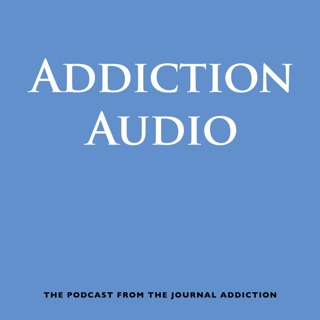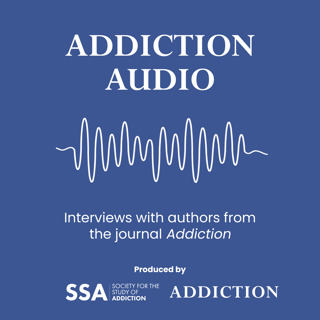
Gambling, risk-taking and alcohol with Tori Horn
In this episode, Tori Horn from the University of Memphis talks about her recent systematic review of risk-taking and gambling whilst drinking.Tori talks about the moderators between alcohol and risk-taking and how her and her colleagues screened 30,000 papers to examine the influence of blood alcohol concentration, gender, the type of gambling and other factors as potential moderators of this relationship.“We thought perhaps that, what’s influencing this is the expectancies, and the vast majority of studies included used the placebo design […] which led us to conclude that maybe people are expecting, once they’re told they’re consuming alcohol, that their behaviour’s going to be different.” Tori talks about the different ways that risk-taking is measured in studies, including inflating balloons until they burst for a cash pay-out. She also explores the problems with lab designs and the challenge of translating research into naturalistic settings. Original research article: Does acute alcohol consumption increase risk-taking while gambling? A systematic review and meta-analysis. By Tori Horn and colleagues. Published in Addiction (2022). Hosted on Acast. See acast.com/privacy for more information.
15 Kesä 202216min

Brief interventions, emergency departments, and alcohol with Paolo Deluca
In this episode of the Addiction Audio podcast, Dr Paolo Deluca talks about his recent research on using brief interventions in emergency departments.The research involved a three-armed randomised controlled trial on brief interventions for young people, and found no significant differences in alcohol-related outcomes between young people who had been given a brief intervention and those who had not. In the podcast, Paolo reflects on some of the potential reasons for this, considering previous evidence in support of brief interventions.“When you move away from an efficacy trial or a single site study where you have highly trained professionals or practitioners delivering the interventions and you move into the real-world NHS setting is where you tend to lose some of the effectiveness you might have had in the early stages of the brief intervention.”Paolo also talks about the core components of brief interventions that can be delivered in 10 minutes in busy emergency departments, and discusses some of the logistical and ethical challenges of recruiting young people to a three-armed trial.“We involved 10 emergency departments, and we ran it for around 8 months and were recruiting from 10am to 10pm in the afternoon and we were covering 7 days a week. To achieve that we had essentially an army of researchers.”Original article: Effectiveness and cost-effectiveness of face-to-face and electronic brief interventions versus screening alone to reduce alcohol consumption among high risk adolescents presenting to Emergency Departments: three-arm pragmatic randomised trial (SIPS Junior High Risk Trial). By Paolo Deluca and colleagues. Published in Addiction (2022). Hosted on Acast. See acast.com/privacy for more information.
8 Kesä 202223min

Drug checking services with Nazlee Maghsoudi
In this episode of Addiction Audio, Nazlee Maghsoudi talks about her recent publication “Drug checking services for people who use drugs: a systematic review”. Nazlee discusses how drug checking services change behaviour, contribute to drug market monitoring and otherwise impact the risk associated with using substances. She talks about the three waves of drug checking services from the late 1960s to present day. Nazlee talks about the benefits of working with library sciences experts when setting the search parameters for her systematic review. She also talks about how important it is for physicians or GPs to know what substances people might have taken. “We know from the systematic review [people who use drug checking services] do make changes in their behaviour, they do take that information into account, and whether it’s choosing to not use, choosing to use less, choosing to seek more information before they use, that gives them information to make more informed choices about the drugs they use.” Nazlee is the Manager of the Policy Impact Unit at the Centre on Drug Policy Evaluation in Toronto, and a PhD Candidate in Health Services Research at the Institute of Health Policy, Management and Evaluation within the University of Toronto.Original research article: Drug checking services for people who use drugs: a systematic review By Nazlee Maghsoudi and colleagues. Published in Addiction (2021) Hosted on Acast. See acast.com/privacy for more information.
7 Huhti 202224min

Drinking patterns during lockdown with Iain Hardie
Dr Iain Hardie talks to Addiction Audio about his research into alcohol use changes during lockdown. His research is the first to report longitudinal data on changes in drinking quantities and characteristics. Dr Hardie talks about using an interrupted time series analysis to identify the impact of the pandemic on drinking habits. “A lot of [drinking] occasions in general that start earlier in the day are quite often people meeting up for long drinking occasions or big social occasions that last the whole day, whereas when lockdowns were in place those occasions weren’t possible so people were drinking later on in the day” Iain discusses how Scotland and England differ in the numbers of people who drink alone and talks about the potential long-term consequences resulting from changes in drinking patters whereby more people currently drink at home and fewer go out to pubs and bars. Hosted on Acast. See acast.com/privacy for more information.
23 Maalis 202216min

Pre-registration with John Marsden
In this episode of Addiction Audio, Professor John Marsden talks about the role of pre-registration in increasing research transparency. He addresses the anxieties that people can have about pre-registration and talks about how it’s really not that difficult or daunting.Professor Marsden talks gets into the detail of pre-registration; when to register, how to register and the importance of planning for – and dealing with – missing data. He covers how plans change during any research project and how to respond when they do. The importance of pre-registration also includes qualitative research and Professor Marsden talks about the need for more qualitative and observational studies to be pre-registered.“We’re really trying to encourage people to just plan, adapt if you need to, change if you have to – but just have a clear narrative about that – and everyone benefits. It means that what was done is much more reproducible.”Professor John Marsden is the Editor-in-Chief of the journal Addiction. He is Professor of Addiction psychology at the Addictions Department, the Institute of Psychiatry, Psychology and Neuroscience, Kings College London.Marsden, J, Cousijn, J and Stapleton, J, Pre‐registration: not a daunting practice. Addiction. 2022. https://doi.org/10.1111/add.15819 Hosted on Acast. See acast.com/privacy for more information.
16 Maalis 202229min

ADHD and maternal substance use with Elis Haan
Dr Elis Haan talks to Dr Rob Calder about ADHD and maternal substance use. She discusses her recent paper which explored the impact of smoking, alcohol and drugs during pregnancy on ADHD outcomes in young people.Elis talks about the differences between maternal and teacher ratings of ADHD. She also explains negative control and polygenic risk score methods used in this study discussing how multiple methods were used across different longitudinal datasets to add confidence to their analysis. “Combining these different methods can help to gain stronger support for a causal effect…. For example, if these different methods and analyses across these cohorts provide similar results we can be more confident that the results reflect a true causal effect. This is because it is unlikely that these different methods will be all biased in the same way”Haan E, Sallis HM, Zuccolo L,Labrecque J, Ystrom E, Reichborn-Kjennerud T, et al. Prenatal smoking, alcohol and caffeine exposure and maternal-reported attention deficit hyperactivity disorder symptoms in childhood: triangulation of evidence using negative control and polygenic risk score analyses. Addiction. 2021;1–14. https://doi.org/10.1111/add.15746. Hosted on Acast. See acast.com/privacy for more information.
28 Helmi 202217min

JITAIs and using smartphones to prevent lapse with Olga Perskie
Rob Calder talks to Dr Olga Perski about her recent research on just-in-time adaptive interventions (JITAIs) whereby smartphones are used to help prevent lapses among people who are trying to quit or reduce alcohol, tobacco or other drug use. Dr Perski talks about why the literature is so complex and how defining JITAIs is difficult in the first place. She talks about the potential for Ecological Momentary Assessment (EMA), GPS positioning and micro-randomised trial studies to contribute in this area, and how we may not want to press ahead with full-scale RCTs before having conducted additional conceptual and computational work to clarify what JITAIs are and how to develop them. Dr Perski also discusses the challenges of regulating mobile health apps so that people can access apps based on evidence of effectiveness. This episode was recorded online on 30 September 2021.Perski, O., Hébert, E.T., Naughton, F., Hekler, E.B., Brown, J. and Businelle, M.S. Technology‐mediated just‐in‐time adaptive interventions (JITAIs) to reduce harmful substance use: A systematic review. Addiction 2021; doi:10.1111/add.15687 Hosted on Acast. See acast.com/privacy for more information.
27 Loka 202130min

Mental imagery and cocaine craving with John Marsden
Rob Calder talks to Professor John Marsden about cocaine cravings. Professor Marsden discusses the lack of pharmacological treatments for cocaine, and about his recent study using mental imagery to address cocaine cravings. He talks about the benefits of positive imagery compared with negative imagery. He then discusses how useful mixed-methods research can be and the importance of writing up data from unfinished trials. Lowry, N., Marsden, J., Clydesdale, B., Eastwood, B., Havelka, E.M. and Goetz, C. Acute impact of self‐guided mental imagery on craving in cocaine use disorder: a mixed‐methods analysis of a randomized controlled trial. Addiction 2021; doi:10.1111/add.15405https://onlinelibrary.wiley.com/doi/full/10.1111/add.15405 Hosted on Acast. See acast.com/privacy for more information.
20 Loka 202131min




















